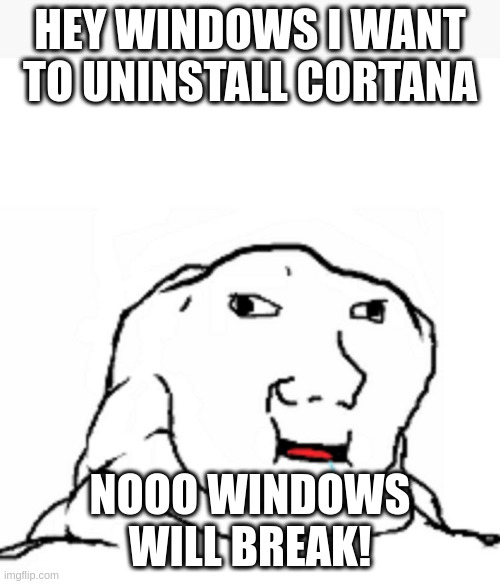this post was submitted on 23 Aug 2023
1065 points (95.0% liked)
Memes
54060 readers
523 users here now
Rules:
- Be civil and nice.
- Try not to excessively repost, as a rule of thumb, wait at least 2 months to do it if you have to.
founded 6 years ago
MODERATORS
you are viewing a single comment's thread
view the rest of the comments
view the rest of the comments

Edgecore sounds like a really exciting but actually bland genre of music.
Sounds like it would be all build-up and never a drop
Edge is completely safe to remove in my testing, at least if removed through the Chris Titus Utility.
Didn't they lose a lawsuit about tying the browser into the OS?
So his Meme is correct the system will break if you force it to uninstall something?
There's a "Getting Started" app built in to win11 that is both completely useless and totally unremovable by any method without breaking the OS.
That's because it's not an app. Do "Winget list" and you'll see it's not there.
It's part of the shell. Open it up, look at task manager, and you'll see it's not spawning new processes. Which also mean it's irrelevant - it doesn't add any background tasks, modifies any files or in anyway interfere with the users. It's quite literally just an icon created by the shell.
Its more of the dependency chain. I wouldn't consider tying your taskbar, web browser, and other microservices together like that a good thing in any ecosystem. Its not really the fact that removing system files breaks your system. Its that the taskbar and web browser should not be considered Core. People want to choose and not have their non-choice staring at them with their new gurl from the sidelines.
You can easily remove Edge but need to install Edge WebView.
The person you are replying to is completely right and you're wrong.
Scroll up. All the way you. See that picture? That's you.
Linux is pretty dogshit as well. I haven't seen a decent UI yet either.
Again. Scroll up. That's a picture of you.
Imagine having no taste and thinking there are decent Linux UIs. Good Jesus.
Most things are probably fine, though Windows updates might do something funky or just put it back from where you threw out that trash.
But Edge is a different story. Microsoft in their infinite wisdom decided to make Edge, their web browser, essential for Windows Explorer, their file manager and desktop among other things, to function properly.
So if you get rid of Edge, things can get kinda fucky. I haven't looked into if someone has made a workaround, I know that there are modified "debloated" Windows installs that do some heavy duty mucking about in there, but I don't know if anyone's figure out how to give Edge the ax without making your desktop freak out.
That was definitely by design. I'm surprised they haven't done that with more of their other bloatware tbh.
You just need to install Edge WebView separately.
Yes, though I'm pretty sure I've uninstalled or atleast disabled cortana with no problems
At some point this holds true for any and all environments.